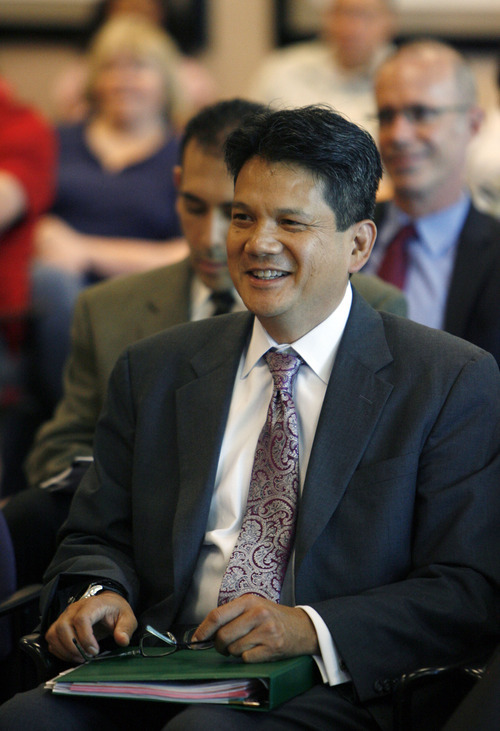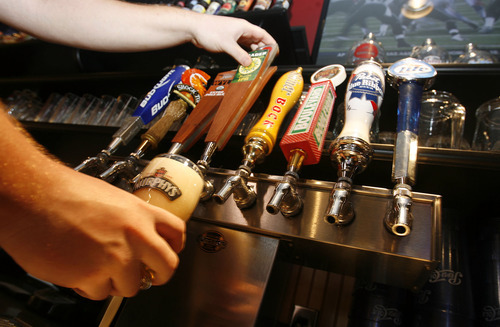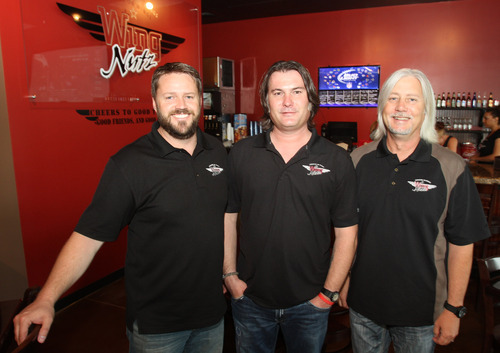This is an archived article that was published on sltrib.com in 2012, and information in the article may be outdated. It is provided only for personal research purposes and may not be reprinted.
In their zeal to tightly control liquor sales and restrict consumption, Utah lawmakers have had to redo or modify legislation they've passed, creating a patchwork of alcohol laws.
The latest fixes came last month, when the Utah Legislature created 90 liquor licenses for restaurants (50 full-service, 40 permitting only beer and wine), which had been in such short supply that national chains delayed breaking ground until more permits became available.
The action, say some commercial developers, will meet demand only until sometime next year when licenses will again run short, stunting growth in an economy that needs all the help it can get.
Developers point out that the same day Gov. Gary Herbert signed the legislation in late June, more than one-third of the new permits were snapped up by businesses that had been waiting for months to obtain one.
Tai Biesinger, CEO of the commercial services firm Pentad Properties, said that with lawmakers' piecemeal approach, licenses could run short as early as next spring. That's exactly what happened last year when the Legislature freed up only 40 additional restaurant licenses, even as dozens of applicants were waiting for permits.
"There's quite a few restaurants looking to come to Utah that have not yet applied for licenses," said Biesinger in calling for a more comprehensive approach. "Unemployment is lower in Utah than the rest of the nation, and along with that comes growth and development. Restaurants are a part of that economic growth."
Even with the additional permits, Utah continues to have the lowest number of alcohol outlets per 1,000 adults among states in the West, according to the National Alcohol Beverage Control Association. And the current quota allows only one full-service restaurant license for every 4,295 residents. In California, it is one license per 2,000 people; in Idaho, it is one per 1,500 people; and in Washington, it is one license per 1,200 residents.
That distinction seems to be fine with key legislative leaders, who insist that restricting consumption translates into less underage drinking and drunk driving. It also sits well with the Legislature as a whole, a majority of whom are members of The Church of Jesus Christ of Latter-day Saints, which teaches its faithful to eschew alcohol.
But Herbert, before calling lawmakers into special session last month, noted how a scarcity of liquor licenses was impacting economic development.
"I think there is a growing awareness that we need to make sure our liquor licenses line up with the demands, particularly restaurants and business establishments that want to come and relocate here in Utah," the governor, a Mormon, said. "I think there is a growing concern and understanding that we are somehow out of sync."
Now, with the additional permits available for the time being, Minneapolis-based Buffalo Wild Wings will break ground for restaurants in West Valley City, South Jordan and Riverdale. Also, Long Horn Steakhouse, headquartered in Florida, will open eateries in South Jordan, Ogden and Midvale in November. Plans for both chains had been on hold because of the absence of alcohol permits.
In addition, Utah-based Wing Nutz converted summer seasonal permits (the only available licenses earlier this year) for year-round licenses for its restaurants in Park City and Ogden. The chain also converted five beer-only licenses to full-service permits once more licenses became available. The chain has 16 restaurants, including a store in Murray that opened June 30. Wing Nutz expects to open a restaurant in St. George in August.
"The scarcity of licenses made it difficult for us to do business," said co-founder Will Owens. "Not being able to sell everything a mainstream restaurant sells put us at a disadvantage."
Steven Bogden, managing director of Coldwell Banker Commercial, said that in "certain situations there should be unlimited licenses, particularly for sit-down restaurants. It's an economic development issue. We could be adding thousands and thousands of jobs if we can get more opportunities for licenses."
But the licenses do come with associated costs. The new law adds four new enforcement officers to the Department of Public Safety and provides funding for overtime pay, allowing highway patrol troopers to conduct more drunk-driving checks.
That's in addition to another law passed last year requiring the state to hire more liquor agents as the number of licenses increase, starting in July. Even if licenses become available, through quotas tied to the state's population, permits cannot be awarded unless additional enforcement officers are hired.
"There's always a concern that with more outlets for alcohol, there will be more social costs," said Sen. John Valentine, R-Orem, who sponsored both bills. "We said we would balance the social costs with additional enforcement."
Absent comprehensive liquor reform, there may be more legislative redos in the coming months.
The legislation passed in the June special session also postpones an earlier law, set to go into effect July 1, which would have allowed owners of existing bars and restaurants to sell permits on the open market if they were going out of business or decided they didn't want one. Under that scenario, developers say that instead of costing a couple of thousand dollars through the state for permits, they could cost hundreds of thousands of dollars when put up for sale‚ much like in Montana and New Jersey, while knocking out small businesses from the marketplace.
If lawmakers decide to allow businesses to sell licenses on the open market, club permits probably will soar in price. That's because even though they've budged on full-service restaurant licenses, lawmakers have stood firm in refusing to create more club permits, resulting in 17 applicants waiting for more than a year for a permit to become available, under current population quotas.
The problem is compounded, say developers, because bar and fine dining permits are lumped into the same "club" category. Bars can serve alcohol without requiring customers to buy food, while fine restaurants, such as Ruth's Chris Steak House, have food requirements. Fine-dining establishments opt for club permits because costs of high-end wines and spirits drive up tabs so that they cannot meet sales ratios of 70 percent food and 30 percent alcohol under restaurant permit requirements.
"The time is right to look at all liquor legislation and form policies that address all needs and concerns," said Biesinger of Pentad Properties. "Without a comprehensive review, liquor laws will continue to be a problem."
But reform is far from imminent.
Said Senate President Michael Waddoups, R-Taylorsville: "The sky isn't falling. We're right where we need to be. We're a liquor-control state — and we will remain a control state."
Twitter@DawnHouseTrib —
How Utah compares
Although Utah lawmakers recently created 90 additional restaurant licenses, the state still has the lowest number of bar and eatery permits among liquor-control states.
Here's the breakdown in the West for retail outlets per 1,000 adults age 21 and over, the legal age to imbibe:
Utah • .92
Idaho • 1.11
California • 1.65
Washington • 1.67
Oregon • 2.37
Wyoming • 3.13
Montana • 3.4
Source: National Alcohol Beverage Control Association







